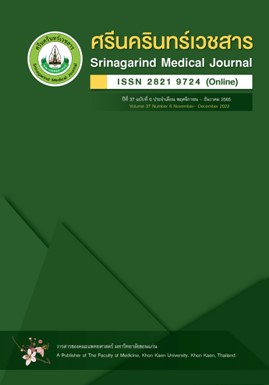ผลการจัดบริการดูแลผู้ป่วยระยะกลางในผู้ป่วยโรคหลอดเลือดสมองระยะฟื้นฟูที่โรงพยาบาลชุมชนแห่งหนึ่งในจังหวัดอุบลราชธานี
คำสำคัญ:
โรคหลอดเลือดสมอง, ผู้ป่วยระยะฟื้นฟู, การจัดบริการดูแลผู้ป่วยระยะกลางบทคัดย่อ
หลักการและวัตถุประสงค์: โรคหลอดเลือดสมอง (stroke) เป็นโรคที่พบบ่อย และเป็นปัญหาสาธารณสุขที่สำคัญของประเทศไทยและประเทศอื่น ๆ ทั่วโลก ควรให้ความสำคัญกับการจัดบริการฟื้นฟูสมรรถภาพผู้ป่วยกลุ่มนี้ ดังนั้นการศึกษานี้จึงมีวัตถุประสงค์เพื่อศึกษาผลการจัดบริการดูแลผู้ป่วยระยะกลางในผู้ป่วยโรคหลอดเลือดสมองระยะฟื้นฟูในด้านความสามารถในการปฏิบัติกิจวัตรประจำวัน
วิธีการศึกษา: การศึกษาจากเหตุไปหาผลแบบย้อนหลัง กลุ่มตัวอย่างคือผู้ป่วยโรคหลอดเลือดสมองจำนวน 35 ราย ที่เข้ารับการรักษาในระบบการจัดบริการดูแลผู้ป่วยระยะกลางแล้วจำหน่ายจากการดูแลผู้ป่วยระยะกลาง ระหว่างวันที่ 1 มกราคม 2563 ถึง 30 เมษายน 2565 โดยผู้ป่วยจะได้รับการฟื้นฟูจากแพทย์ผู้ประกอบวิชาชีพเวชกรรมและนักกายภาพบำบัดที่ผ่านการฝึกอบรมการดูแลผู้ป่วยระยะกลางพร้อมกับทีมสหสาขาวิชาชีพ ใช้แบบประเมินกิจวัตรประจำวันดัชนีบาร์เธล (barthel index, BI) ฉบับภาษาไทยประเมินผลติดตามฟื้นฟูจนครบ 6 เดือน วิเคราะห์ข้อมูลโดยการแจกแจงความถี่ ร้อยละ ค่าเฉลี่ย ส่วนเบี่ยงเบนมาตรฐาน และเปรียบเทียบความสามารถในด้านความสามารถในการปฏิบัติกิจวัตรประจำวันด้วยสถิติ chi-square test, paired sample t-test และ repeated measurement ANOVA
ผลการศึกษา: ผลการศึกษาพบว่ากลุ่มตัวอย่างเป็นเพศหญิง ร้อยละ 51.43 อายุเฉลี่ย 56.14±13.98 ปี เป็นผู้ป่วยโรคหลอดเลือดสมองตีบ (ischemic stroke) ร้อยละ 85.71 หลังฟื้นฟูสมรรถภาพอย่างต่อเนื่องจนครบ 6 เดือน ผู้ป่วยมีความสามารถในการปฏิบัติกิจวัตรประจำวัน ทุกด้านเพิ่มขึ้นอย่างมีนัยสำคัญทางสถิติ (คะแนนก่อนและหลังฟื้นฟู เท่ากับ 6.11±5.78 และ 15.43±5.43 คะแนน ตามลำดับ และความแตกต่างของค่าเฉลี่ย เท่ากับ 9.31 คะแนน, p<0.001) ผู้ป่วยหายเป็นปกติหรือไม่มีการสูญเสียสมรรถภาพการปฏิบัติกิจวัตรประจำวันร้อยละ 25.71
สรุป: การจัดบริการดูแลผู้ป่วยระยะกลางทำให้ผู้ป่วยมีความสามารถในการทำกิจวัตรประจำวันเพิ่มขึ้น ควรพัฒนาระบบการดูแลฟื้นฟูผู้ป่วยตามบริบทความพร้อมของโรงพยาบาล
เอกสารอ้างอิง
Department of thai traditional and alternative medicine. Service guidelines for acupuncture in stroke rehabilitation. Bangkok: Phumthong shop; 2020.
Prasat Neurological Institute. Clinical practice guidelines for stroke rehabilitation. Bangkok: Thanapress company limited; 2014
Strategy and Planning Division of the Permanent Secretary Ministry of Public Health. public health statistics 2017 (online) [cited July 7, 2022]. Available from:http://bps.moph.go.th/new_bps/sites/default/files/stratistics60.pdf.
Tiemkao S. Cerebrovascular disease situation. Neurothai 2021;37(4):54-60.
The Royal College of Physiatrists of Thailand, National Health Security office, Sirindhorn National Medical Rehabilitation Institute. Subacute rehabilitation. Nonthaburi: Association of Rehabilitation Medicine of Thailand; 2016.
Health Administration Division. Guideline for intermediate care (Service Plan). Samut Sakhon: Born to be publishing co; 2019.
Satirangkoon T, Wongsuwansiri S, Kladchompong P. Clinical practice guidelines for intermediate care. Nonthaburi: Nursing division; 2019.
Jutaphutthi A, Siangprasert W, Limsila B, Suttachaiananta T. Service guidelines for acupuncture in stroke rehabilitation. Nonthaburi: Department of thai traditional and alternative medication; 2020.
Hsueh IP, Lee MM, Hsieh CL. Psychometric characteristics of the Barthel activities of daily living index in stroke patients. J Formosan MediAssoc 2001;100(8):526-32.
Hsueh IP, Lin JH, Jeng JS, Hsieh CL. Comparison of the psychometric characteristics of the functional independence measure, 5 item Barthel index, and 10 item Barthel index in patients with stroke. J Neurol Neurosurg Psychiatry 2002;73(2):188-90.
Geraint F. Neurological examination made easy. 2, editor. Edinburgh: Churchill Livingstone; 1999.
Chueluecha C. Rehabilitation in Stroke. Thammasat Med J 2012;12(1):97-111.
Brunnnstrom S. Movement therapy in hemiplegia: A neurophysiological approach. New York: Harper and Row; 1970.
Moonthee W, Monkong S, Sirapongam Y, Leelacharas S. Impact of transitional care programme and family caregivers on stroke patients’ routine activity performance, complications, and satisfaction. J Thai Nurs Midwifery Council 2016;31(1):95-110.
Kwansanit T. Outcomes of Sub-acute rehabilitation program in stroke patient, Suratthani hospital. Reg11 Med J 2017;31(4):723-32.
Suwannachat P, Pansuvannajit P, Jiraporncharoen W. An intermediate care service to improve activities of daily living in patients with stroke, spinal cord injury and traumatic brain injury in Sarapee Borvorn Patthana Hospital, Chiang Mai Province. Lanna Public Health J 2021;17(2):78-89.
Namchandee A. Outcomes of intermediate rehabilitative care in sub-acute stroke patients. Buddhachinaraj Med J 2021;38(3):356-67.
Srisubat A, O-charot L, Loharjun B, Siriwatvejakul U, Kuptniratsaikul V, Opachalermphan S. Cost-effectiveness of intermediate care (inpatient) in post-acute stroke compared with out-patient rehabilitation program. J Diagnostic Med Sonography 2019;44(5):167-73.
Sakulpipatana P. Outcome of Subacute Post-stroke rehabilitation in outpatient-based vs home-based. Reg11 Med J 2021;35(2):1-11.
Chiangchaisakulthai K, Suppradit W, Samipak N. Intermediate Care. Nonthaburi: International Health Policy Program; 2019.
ดาวน์โหลด
เผยแพร่แล้ว
รูปแบบการอ้างอิง
ฉบับ
ประเภทบทความ
สัญญาอนุญาต
ลิขสิทธิ์ (c) 2022 ศรีนครินทร์เวชสาร

อนุญาตภายใต้เงื่อนไข Creative Commons Attribution-NonCommercial-NoDerivatives 4.0 International License.




